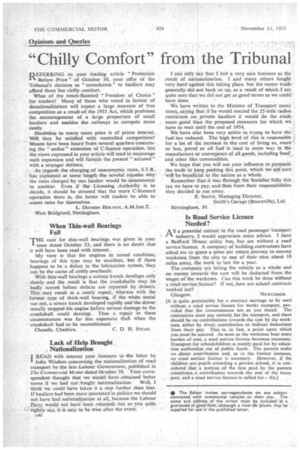"Chilly Comfort" from the Tribunal
Page 146

If you've noticed an error in this article please click here to report it so we can fix it.
EFERRING to your leading article "Protection Before Price" of October 30, your offer of the Tribunal's decision as " consolation" to hauliers may afford them but chilly comfort. What of the much-flaunted Freedom of Choice" for traders? Many of those who voted in favour of denationalization will expect a large measure of free competition as a result of the 1953 Act, which professes the encouragement of a large proportion of small hauliers and enables the railways to compete more easily. Doubtless to many users price is of prime interest. Will they be satisfied with controlled competition? Moans have been heard from several quarters concerning the "undue" extension of C-licence operation, but the views expressed in your article will tend to encourage such expansion and will furnish the present "accused" with a stronger defence. As regards the charging of uneconomic rates, S.T.R. has explained at some length the several reasons why the rates charged by one haulier would be uneconomic to another. Even if the Licensing Authority is to decide, it should be stressed that the more C-licensed operation there is, the better will traders be able to assess rates for themselves.
L. DONSON HOLMES, A.M.Jnst.T. West Bridgford, Nottingham.
When Thin-wall Bearings Fail
THE case for thin-wall bearings was given in your issue dated October 23, and there is no doubt that it will have been read with interest.
My view is that for engines in sound condition, bearings of this type may be excellent, but if there happens to be a defect in the lubrication system, they can be the cause of costly overhauls. With thin-wall bearings a serious knock develops only slowly and the result is that the crankshafts may be badly scored before defects are reported by drivers. This may result in a costly repair, whereas with the former type of thick-wall bearing, if the white metal ran out, a severe knock developed rapidly and the driver usually stopped his engine before serious damage to the crankshaft could develop. Thus a repair in these .circumstances was far less expensive thal when the crankshaft had to he reconditioned, Cheadle, Cheshire. C. D. H. STEAD.
Lack of Help Brought Nationalization
I READ with interest your footnote to 'the letter by A John Wisdom concerning the nationalization of road transport by the late tabour Government, published in The Commercial Motor dated October 30. Your correspondent thought that we would have obtained better terms if we had not fought nationalization. Well, I think we could have taken it a step further than that. If hauliers had been more interested in politics we should not have had nationalization at ail, because the Labour Party would not have -been returned, but as -you quite rightly say; it. is easy to be wise after the event. E40 I can only say that I lost a very nice business as the result of nationalization. I and many others fought very hard against this taking place, but the motor trade generally did not back us up, as a result of which I am quite sure that we did not get as good terms as we could have done.
We have written to the Minister of Transport many times, saying that if he would rescind the 25-mile radius restriction on private hauliers it would do the trade more good than the proposed measures for which we have to wait until the end of 1954.
We have also been very active in trying to have the fuel tax reduced. The high level of this is responsible for a lot of the increase in the cost of living as, more or less, petrol or oil fuel is used in some way in the manufacture or conveyance of all goods, including food and other like commodities.
We hope that you will use your influence to persuade the trade to keep pushing this point which we are sure will be beneficial to the nation as a whole.
Remember that it was through the Socialist folly this tax we have to pay, and then from their responsibilities they decided to run away. E. 'Smrrii, Managing Director, Smith's Garage (Bournville), Ltd. Birmingham, 30.
Is Road Service Licence Needed?
AS a potential entrant to the road passenger transport industry, I would appreciate some advice. I have a Bedford 30-seat utility bus, .but am without a road service licence. A company of building contractors have asked me to quote a price per return journey, to convey workmen from the city to one of their sites about 10 miles away, the work to last for a year. The company are hiring the vehicle as a whole and no money towards the cost will be deducted from the wages of the workmen. Can this work be done without a road service licence? If not, how are school contracts worked out?
Glasgow. NEWCOMER.
[It is quite permissible for a contract carriage to be used without a road service licence for works transport, provided that the circumstances are as you stated. The contractors must pay entirely for the transport, and there should be no contributions towards the cost by the workmen, either by direct contribution or indirect deductions from their pay. This is, in fact, a point upon which you must be assured_ As soon as the workmen bear some burden of cost, a road service licence becomes necessary. Transport for schoolchildren is mostly paid for by education authorities out of public funds. The parents make no direct contribution and, as in the former instance, no road service licence is necessary. However, if the children are pupils attending a private school, it is considered that a portion of the fees paid by the parents constitutes. a contribution towards the cost of the transport, and a road service licence is called for.—ED.]












































































































































































































































